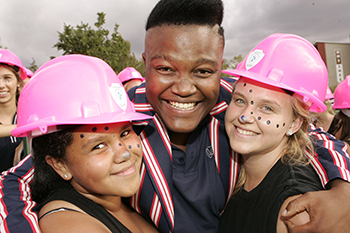
The First-year Athletics event was a celebration of colour and fun. Besides the athletics on and around the track at Pellies Park on the Bloemfontein Campus, the first-years encouraged their different residences with great enthusiasm.
Photo: Johan Roux |
Six out of six.
This is the proud record Wag-’n-Bietjie can boast of after the residence walked away with the women's athletics trophy for the sixth year in a row during the University of the Free State's first-year athletics meeting.
This year's men's winner, Vishuis, attained a hat trick on 20 January 2016 at Pellies Park on the Bloemfontein Campus when the residence was once again named as the athletics champion. Vishuis also won in 2014 and 2015.
What makes Wag-’n-Bietjie's triumph even more remarkable is the fact that the residence ran the fastest, jumped and threw the farthest in eight out of the past nine years. Marjolein won in 2010.
Sonnedou was second, with Roosmaryn and Soetdoring collectively the third women's residences. In the men's division, Legatum and Armentum were second and third respectively.
Sonnedou has the best spirit
The event, a celebration of colour and fun, was characterised by groups of singing first-years yelling their lungs out. The UFS Student Representative Council judges the winners of the different Spirit trophies.
Sonnedou was the overall winner of the Spirit trophy – something even more important than the action on and around the track for some residences.
Sonnedou was named the winner in the division for women's residences, after which the residence was also crowned as overall winner. Welwitschia and Vergeet-My-Nie were second and third respectively in the women's division.
In the men's division, Armentum, who continued singing even when it was raining later in the evening, was the well-deserved winner of the Spirit trophy. Villa Bravado was second with Tswelopele third.
Conlaurês won the Spirit trophy for Co-ed residences, with Imperium and Kagiso second and third respectively.
Wayde a special guest
The Kovsie athlete, Wayde van Niekerk, who also participated in the first-year athletics meeting in his day, was a special guest.
The 400 m athlete, who will represent South Africa at the 2016 Olympics in Rio de Janeiro, was presented to the first-years during the official welcoming ceremony.
Van Niekerk is still the Kovsie record holder in some events, including the 200 m and the 400 m, as well as the 4 x 100 m team relay event.
Team and individual results for the event.